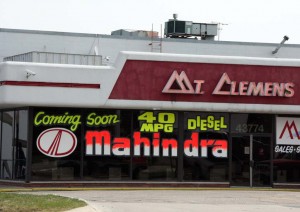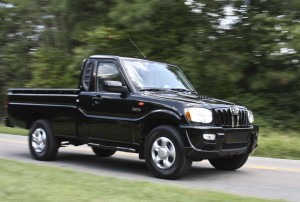With its planned American debut still indefinitely delayed, Indian automaker Mahindra is taking unfair advantage of an escape clause in its contract with U.S. distributor Global Vehicles USA to terminate their relationship, GV USA CEO John Perez claims.
Perez says Mahindra is attempting to claim exclusive ownership of the distribution and sales channel ahead of the arrival of its small diesel pickup in the United States, a development that has been expected for the last 18 months.
Mahindra officials in India did not respond Thursday to requests for comment.
GV USA and Mahindra are fighting in arbitration and in federal court over repeated delays getting Mahindra’s clean-diesel pickup certified for sale in the U.S. At the same time, Mahindra has issued two press releases stating that its relationship with GV USA has “expired.”
Mahindra’s clean-diesel pickups were expected to go on sale in the U.S. by the first quarter of 2009 but their arrival now has been pushed back four times; the latest on-sale date is reportedly this December.
(Click Here for TheDetroitBureau.com’s review of the Mahindra Pik-Up.)

A former Chrysler dealership, in Mt. Clemens, MI, continues to wait for its first Mahindra vehicles.
The original delays were technical problems with getting the trucks ready to meet U.S. standards, Perez said, but he blamed the last few delays on Mahindra, saying the automaker is trying to bully GV USA into stepping aside and letting Mahindra exclusively run the U.S. pickup truck distribution.
In September 2006, according to Perez, the companies signed a contract that gave Atlanta-based GV USA a 15-year exclusive distribution agreement to sell Mahindra vehicles in the U.S. But the latest delays in bringing the trucks here have opened an opportunity for Mahindra to void the contract, citing a clause in that contract that limited it to three years if the trucks weren’t certified for sale in the U.S. by the end of that three-year period.
Perez said the clause was inserted into the contract during last-minute negotiations in Paris in 2006, because Mahindra was concerned that it could be sued if the pickups weren’t able to meet strict U.S. federal safety and emissions standards for technical reasons. The clause gave Mahindra three years from when the contract was signed to get the trucks up to U.S. standards.
“The purpose of the clause was very clear,” Perez said. “If Mahindra was not able to meet [U.S. standards], we’d both walk away and take our losses, period. We didn’t think this would be something they would try to use against us down the road, which is what they are trying to do now. We [made it] for three years, thinking that would be enough time. We didn’t want to keep investing in it [if they couldn’t].”
What’s unclear is how both companies are interpreting the clause today.
Perez says that as long as the trucks were ready to pass U.S. standards – which he says they could have done by late last year – the spirit of the clause was met and could no longer be used by Mahindra as an out from the contract. But Perez says that Mahindra is interpreting the clause to mean at the moment the trucks were certified for sale by the U.S. government; the last hurdle was passed on Aug. 20 when the clean diesel was granted EPA emissions certification.
Before a vehicle can be imported, it must have a label that certifies it meets U.S. safety standards and the EPA must verify that it meets air-quality standards. The federal agencies verify the information but don’t perform the testing.
According to Perez, Mahindra and GV USA agreed to two extensions to the clause beyond its original date of August 31, 2009 because of delays. The last extension was through June 11 – the same day that GV USA filed suit in US federal court to prevent Mahindra from distributing vehicles directly in the U.S. or with a new partner.
“In October 2009, Dr. [Pawan] Goenka [president of Mahindra’s automotive business], told us that it was all green and there was nothing that would prevent us from getting certification,” Perez said. “All we had to do was finalize the 100,000-mile road test [for EPA certification]. As far as we were concerned, at that point, the clause was no longer an issue any more. We knew Mahindra could achieve the certification.”
Mahindra hired third-party suppliers, including Bosch, AVL and MB Tech, a subsidiary of Mercedes-Benz, to help its pickups meet U.S. Standards. According to Perez, positive information from those companies was the basis for the expectation that the trucks would meet safety and emissions standards.
“They did all the testing and then they would provide the U.S. government with the results that they passed,” Perez said. “All of the tests were passed.”
In March, Perez says that Mahindra began to pressure GV USA to sell certain assets and indicated that Mahindra wanted to pick select dealers. The terms weren’t favorable to GV USA, which says it has signed up more than 350 dealers and spent almost $35 million preparing for the launch.
“I said we wouldn’t do that,” Perez said. “If [Mahindra] wanted to buy the [entire company], we’d sell it at a reasonable value” but not parts of it.
When Perez didn’t agree, Perez says that Mahindra stopped communicating with GV USA about the final certification for the trucks, in what Perez said was an effort to put pressure on GV USA.
“We knew then they would try to use the June 11 date to try to do what they’re doing now,” Perez said. “That day, Mahindra’s M&A team from India said that if we didn’t agree to the terms they were offering, they would cancel the contract. They threatened us. We filed [the lawsuit] right after that.”
In early May, Goenka told Automotive News that Mahindra had successfully finished its testing and would submit its final paperwork to the EPA with the expectation that it would be certified by the end of June.
“I look back now. If we ever made a mistake, it was at 11 at night in Paris,” Perez said. “They came sneaking into the hotel and they knew we didn’t have lawyers to represent us.” The contract had been negotiated in the U.S. before Paris. “We wrote the clause in principle in the contract. I look back: Was it their intent to use the clause? I don’t know.”
Now, the case is in the hands of a federal judge to decide.
Mike Levine is a regular contributor and the editor of PickupTrucks.com

